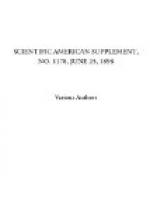Fourth, and finally, those who divide human culture according to the food supply consider that the highest stage is reached through commerce. Commerce brings to all the great centers of human life the food essential to their sustenance. It would be absolutely impossible—obviously so—to have a city like Philadelphia in existence for a month without constant and ceaseless commerce brought here the food for its inhabitants. It is quite likely that, were Philadelphia shut off at once from all connection with the world, within ten days there would be an absolute famine here—so closely do we depend upon our commercial supplies for our subsistence. These supplies are not drawn from any one locality; were we to draw a radius of five hundred miles around our great city of a million inhabitants, we should still find that the greater part of our food supply comes from a wider distance from us than that; and there is no one of us that will go to his table this evening but will see upon that table food products drawn from every quarter of the world. Thus it is that commerce enables man to reach an indefinite degree of consolidation; and it is through consolidation—through the more and more intimate relationship, and the closer and closer juxtaposition of man—that his real benefit and progress may be derived.
These, therefore, are the four stages of culture, as depending upon food supply: the hunting and fishing stage, the nomadic or pastoral, the agricultural and the commercial. These have been generally adopted by English writers, and they are so adopted to-day; and you will probably find them in many of the text books.
The American writers have, in many instances, followed the principles laid down and defined most clearly by Mr. Lewis H. Morgan, a distinguished ethnologist of the last generation. He divides (or accepted the division and largely defined it) the progress of man into a series of stages: beginning at the lowest point with savagery; then barbarism, semi-civilization, civilization, and fifth, enlightenment.
I may briefly refer to what he would include in these and the main criteria which he gives for each of them. He would place the savage condition as being that of the lowest tribes known to us. They have little or no agriculture; their commerce is very inchoate and rude: they have no knowledge of the metals as such; their best weapon is the bow and arrow, or the throwing stick; and their best tool is the stone hatchet and the stone spade. This is very much like the lowest condition of the “wild people” to whom I referred.




